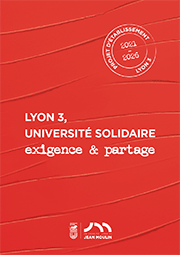AccueilRechercheProgrammes et productions scientifiquesThèsesThèses soutenuesThèses soutenues - 2006-2021Thèses soutenues - 2016
-
Partager cette page
- Recherche,
PORCELLI Fédérica
Le contr?le de la Cour de Cassation sur la motivation des sentences : une comparaison entre France et Italie
Publié le 4 mai 2016 – Mis à jour le 4 mai 2016
Thèse en Droit comparé soutenue le 5 avril 2016 en cotutelle avec l'Université degli Studi di Roma Tor Vergata - Rome, Italie
Cette thèse suppose l’examen du contr?le de la Cour de cassation fran?aise et de la Cour de cassation italienne sur la motivation des jugements afin de voir dans quels objectifs et de quelle fa?on est utilisée la technique du manque de base légale. Cette recherche suppose en effet de rechercher la politique jurisprudentielle de la Cour de cassation fran?aise au regard de ce cas d’ouverture à cassation et de comparer avec l’évolution législative et jurisprudentielle en Italie, pays dans lequel peut se constater une érosion du contr?le de la motivation. En effet, suite à la réforme de l’été 2012, l’art. 360, alinéa 1°, n. 5, c.p.c. italien n’accorde plus aux parties la possibilité de se pourvoir en cassation en invoquant l’omission, l’insuffisance ou la contradiction de la motivation, mais dispose que le pourvoi en cassation n’est ouvert que pour défaut de considération d’un fait concluant pour la solution du litige et de nature controversée. Or, une telle réforme pose la question de la portée juridique de la nouvelle version de l’art. 360, alinéa 1°, n. 5, c.p.c.italien, étant nécessaire de savoir si en Italie l’insuffisance des motifs de fait donne est encore un motif d’ouverture à cassation. L'analyse de la technique au moyen de laquelle la Cour de cassation fran?aise garantit les parties contre l'exercice arbitraire du pouvoir judiciaire devient un instrument de recherche indispensable afin de trouver une solution interprétative qui permettra de continuer à dénoncer devant la Cour de cassation italienne l'utilisation - ou plut?t le non-examen - de maximes de l'expérience dans le cadre du nouvel art . 360 , par. 1 , n. 5 , c.p.c. italien. Cette analyse mettra en relief que les problématiques découlant du contr?le de la suffisance des motifs de fait sont différentes en Italie et en France. En Italie, cela soulève la question de la compatibilité de ce contr?le avec la fonction de cassation et de la portée juridique de l’art. 360, alinéa 1°, n. 5, c.p.c. En revanche, en France ces problèmes ne se profilent pas, même si se pose la question de l’usage politique du défaut de base légale.
This thesis involves the examination of the control of the French and Italian Highs Courts on the motivation of judgments in order to see what are the objectives and how is used the technique of the lack of legal basis. It assumes also to seek the judicial policy of the French Court of Cassation with regard to this case of appeals in cassation compared to the legislative developments and case law in Italy, which may see an erosion of the motivation’s control.Recently the art. 54, par. 1, l. b), d.l. n. 83/2012 has transformed the grounds for cassation ?failure, insufficient or contradictory reasoning about a controversial and decisive fact for the judgment? (art. 360, par. 1, n. 5, Italian c.p.c.) in that of ?failing to examine about one crucial fact for the judgment which has been the object of discussion between the parties?, thus raising the question of the possibility to continue denouncing the defect of insufficient motivation to the Supreme Italian Court. In particular, the comparative study aims to analyse the way, the technique and the objectives with which the French Court of cassation guarantees the parties against the arbitrary exercise of judicial power in order to identify, for a verse, an interpretative solution which will allow to continue to censor the use - or rather the failure to consider - the maximum of experience under the new art. 360, par. 1, n. 5, c.p.c. and, secondly, to identify the similarities and differences between the control of the French and Italian Highs Courts on the motivation of judgments.
This thesis involves the examination of the control of the French and Italian Highs Courts on the motivation of judgments in order to see what are the objectives and how is used the technique of the lack of legal basis. It assumes also to seek the judicial policy of the French Court of Cassation with regard to this case of appeals in cassation compared to the legislative developments and case law in Italy, which may see an erosion of the motivation’s control.Recently the art. 54, par. 1, l. b), d.l. n. 83/2012 has transformed the grounds for cassation ?failure, insufficient or contradictory reasoning about a controversial and decisive fact for the judgment? (art. 360, par. 1, n. 5, Italian c.p.c.) in that of ?failing to examine about one crucial fact for the judgment which has been the object of discussion between the parties?, thus raising the question of the possibility to continue denouncing the defect of insufficient motivation to the Supreme Italian Court. In particular, the comparative study aims to analyse the way, the technique and the objectives with which the French Court of cassation guarantees the parties against the arbitrary exercise of judicial power in order to identify, for a verse, an interpretative solution which will allow to continue to censor the use - or rather the failure to consider - the maximum of experience under the new art. 360, par. 1, n. 5, c.p.c. and, secondly, to identify the similarities and differences between the control of the French and Italian Highs Courts on the motivation of judgments.
Mots-Clés : Défaut de base légale, Motivation, Cour de cassation
Keywords : Lack of lawful basis, Motivation, Court of cassation
Bruno SASSANI
Membres du jury :
- SASSANI Bruno Nicola Professeur Université Luiss Guido Carli, Italie
- BLERY Corinne Ma?tre de conférences Université de Caen
- CHAINAIS Cécile Professeur des universités Université Assas Paris 2
- CAPONI Remo Professeur Université de Florence, Italie
- CAPPONI Bruno Professeur Université Luiss Guido Carli, Italie
- FERRAND Frédérique Professeur des universités Université Jean Moulin Lyon 3
Président du jury : Bruno CAPPONI
Mention : Très honorable avec les félicitations
Equipe d'accueil : EDIEC
Documentation
Mise à jour : 4 mai 2016







